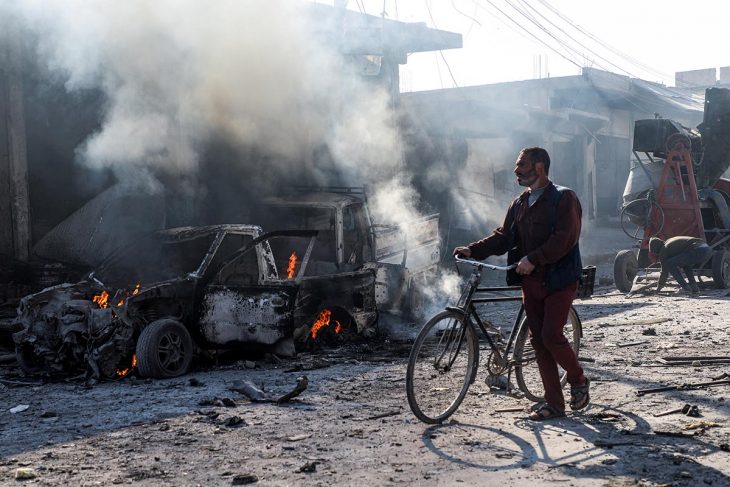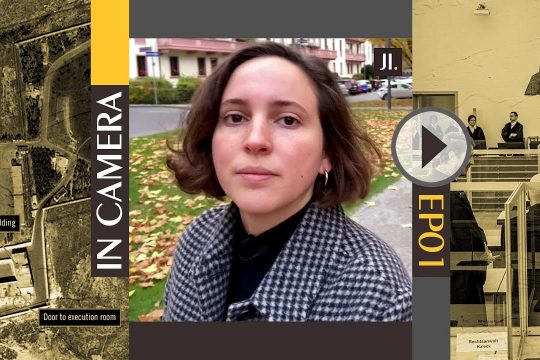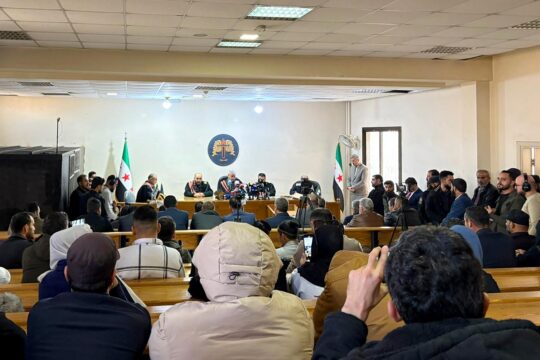On 10 February 2015, Syrian rebel Mouhannad Droubi appeared before the District Court of Södertörn, south of Stockholm. Droubi, a veteran of the Free Syrian Army (ASL) and refugee in Sweden since September 2013, was charged with particularly aggravated assault and accused of war crimes. In a video broadcast on Facebook in the summer of 2012, he is seen beating up a supposed soldier of the Syrian loyalist army and threatening to cut out his tongue. The video, which he himself posted online, got lost in the limbo of social networks before being anonymously transmitted to the Swedish police in July 2014, leading to an investigation and his arrest three months later.
“It was the first time a Syrian citizen was prosecuted abroad for international crimes during the current conflict,” stresses prosecutor Hanna Lemoine. “So we had to rely on ourselves on how to build the bases of the case since there was no previous jurisprudence.” In particular, it was necessary to legally characterize the ongoing armed conflict in order to support the war crime charge. After several twists and turns in the trial and appeal, Droubi was finally sentenced to eight years in prison for this crime in August 2016.
Imbalance?
This created controversy in the Syrian community in exile. While the Droubi case was hailed as a first in the fight against impunity, it nonetheless concerned a member of the opposition. At a time when evidence of the multiple crimes committed by the regime were accumulating, the conviction of the former ASL soldier rubbed some people up the wrong way, especially when this case was followed a few months later in Sweden by a life sentence on another rebel fighter, Haisam Omar Sakhanh, for the execution of seven regular army soldiers.
“The lesson we learned was that we definitely needed to communicate better,”says Hanna Lemoine. “Because for us, it is obvious that we follow the evidence and prosecute whenever we have enough, no matter the political side of the suspect. But what is so obvious to us actually needs to be explained to the public.” The Swedish police then developed brochures in several languages, including Arabic, explaining the work carried out and calling on Syrians to testify.
Founded in 2008, the International Crimes Unit of the Swedish Public Prosecutor's Office now has 16 prosecutors, assisted by 15 officers from the war crimes unit of the national police. Like Germany, Sweden has "absolute" universal jurisdiction, so it does not need the presence of the suspect on its territory to initiate prosecutions. “We have an obligation to investigate if we believe a crime was committed, and in theory we could open an investigation on any international core crime committed anywhere in the world,” explains Lemoine, “But the reality puts limits on what we do. Most of the time, to be able to open a pre-trial investigation means that the suspect or witnesses and victims are in Sweden.”
Third conviction: a soldier of the regime
In September 2017, the conviction of a former soldier in Bashar Al-Assad's army once again propelled Swedish justice to the rank of pioneer. Mohammed Abdullah had been spotted on his arrival in Sweden in 2015 by the Syrian human rights organization Al Kawakibi and reported to the asylum office and then the police. First arrested in 2016, the former soldier was first released for lack of evidence, despite strong suspicions. It was a photo in which he posed smiling, with his foot on a pile of corpses, that allowed him to be charged the following year and sentenced to eight months in prison for "outrages upon human dignity" as a war crime.
The prosecution had to drop the murder charge. “Of course we tried to go as far as we could, to get evidence of the murders,” says Patricia Rakic-Arle of the police war crimes unit. “But we couldn't prove the suspect’s implication because all we had was a picture.” But however "light" the sentence may seem, the conviction was no less historic. This was the very first time that a member of the regime had been tried for crimes committed since 2011. And the trial remained unique until the opening of the so-called Al-Khatib trial in Germany in 2020.
At the same time, the Swedish Public Prosecutor's Office opened a wide-ranging investigation as early as 2015. “Before the judgment on appeal [of Droubi], I opened a structural investigation also to reach out to the Syrian community, to gather their evidence,” recounts Lemoine. “We learned lessons from investigations in Rwanda, where we heard victims and witnesses of events that happened more than 20 years ago. We understood that if we could have catalogued evidence and documented these events earlier, it would have been better. The opening in 2012 of an investigation of this type in Germany has been a source of inspiration.” “Since we have an important Syrian community in Sweden, we understood there was potentially a lot of evidence in our country regarding the crimes committed in Syria,” Lemoine continues. "We wanted to make sure we do our part in the fight against impunity. The idea behind this structural investigation is also to preserve evidence, to make sure we have these events documented, so it can be used in any case, in particular in Europe or in a potential international jurisdiction one day."
Some 50 Syrian probes
At the same time, about 50 individual investigations are now underway in Sweden, according to the Swedish police war crimes unit. While the majority concern former members of Daesh, particularly foreign fighters, a few cases concern individuals affiliated with other rebel groups, and about ten concern individuals linked to the Syrian regime. These are long-running investigations, all the more complex as the situation in Syria continues to evolve.
“The conflict has been going on for almost a decade, with many parties, and the evidence is scattered all around the world, if not lost,” stresses Lemoine. “So to be able to place a crime in its proper context is a real challenge. The changing situation also has an impact on the testimonies we can get. For example, a witness that would be willing to testify a year into the conflict might have a different position now.”
“We hoped that Syrian citizens, when they come to Sweden and feel secure, would come to talk to us more willingly,” says Rakic-Arle. “But that has not happened, on the contrary. We have seen that when people get their permanent residency in Sweden, they tend to want to distance themselves from what happened in Syria and focus on being a part of Swedish society. They are afraid of the consequences for their family back in Syria, but they also want to forget the traumas they went through. They want to go on with their lives.”
Complaint against 25 senior officials
The Swedish authorities therefore welcomed with even more interest the complaint filed in February 2019 by nine survivors of 15 regime detention centres, targeting 25 high-ranking Syrian intelligence officials. At the heart of the case are accusations of illegal kidnapping, particularly aggravated assault, rape, war crimes and crimes against humanity. But it faces legal limits: while Sweden has had universal jurisdiction over war crimes and genocide for half a century, as well as any ordinary crime carrying a sentence of over four years in prison, crimes against humanity were not codified there until 2014, with the incorporation of the Rome Statute of the International Criminal Court. And this law is not retroactive.
"The crimes involved in the complaint were committed between 2011 and 2015, so most of them cannot be prosecuted as crimes against humanity,” explains Aida Samani, legal adviser to the NGO Civil Rights Defenders which filed the complaint together with the plaintiffs. “They can, however, be prosecuted as war crimes and as specific crimes such as particularly aggravated assault, rape, illegal abduction, murder etc. Each individual crime must be looked into and prosecuted.” Another surprising factor is that the crime of torture still does not exist under Swedish law. “So instead of torture, the indictment would be ‘particularly aggravated assault’,” says Samani. “On the symbolic level, the issue is that we can’t call these crimes what they really are."
Two years after their hearings, the plaintiffs have not heard from the public prosecutor's office. But the investigations are continuing, prosecutor Hanna Lemoine asserts. “All the information brought to us through this complaint has been incorporated into investigations that are already ongoing or allowed us to open new ones.”
Towards international arrest warrants?
This Swedish complaint is part of an initiative launched in several European countries by the European Centre for Constitutional and Human Rights (ECCHR) and three Syrian organizations: the Syrian Centre for Media and Freedom of Expression (SCM) and the Syrian Centre for Legal Studies and Research (SCLSR), led by lawyers Mazen Darwish and Anwar Al-Bunni, and the Caesar Files Group. The aim is to initiate proceedings against the highest officials of the Syrian state and ensure they are subject to international arrest warrants, like those issued by Germany and France against Jamil Hassan, former head of Air Force Intelligence, and Ali Mamlouk, head of Syrian National Security.
But it is not certain that Sweden will choose this path. “In theory we can do it,” says the prosecutor. “But we would first have to consider if we would be granted the mandate from the Swedish government to prosecute.” For in any case involving universal jurisdiction, Swedish prosecutors must seek express authorization from the government before any indictment. "No criteria [for justification] are mentioned in the law, which gives the government wide discretionary power," notes a report by the NGOs Trial International and Open Society Justice Initiative on Swedish universal jurisdiction. “This could potentially be a major obstacle to prosecution of foreigners, especially high ranking ones, and there is no recourse available to challenge the government’s exercise of decision.” To date, this authorization has never been refused. But the Syrian suspects pursued in Sweden were only subordinates, present on the territory. And so far, Sweden has never issued international arrest warrants in such cases.
"This case is strategic to us also because we wanted to test the limits of the authorities, to see if international arrests warrants are a possibility,” says Samani. “There is indeed a legal possibility. The question is whether they would go for it or not."







